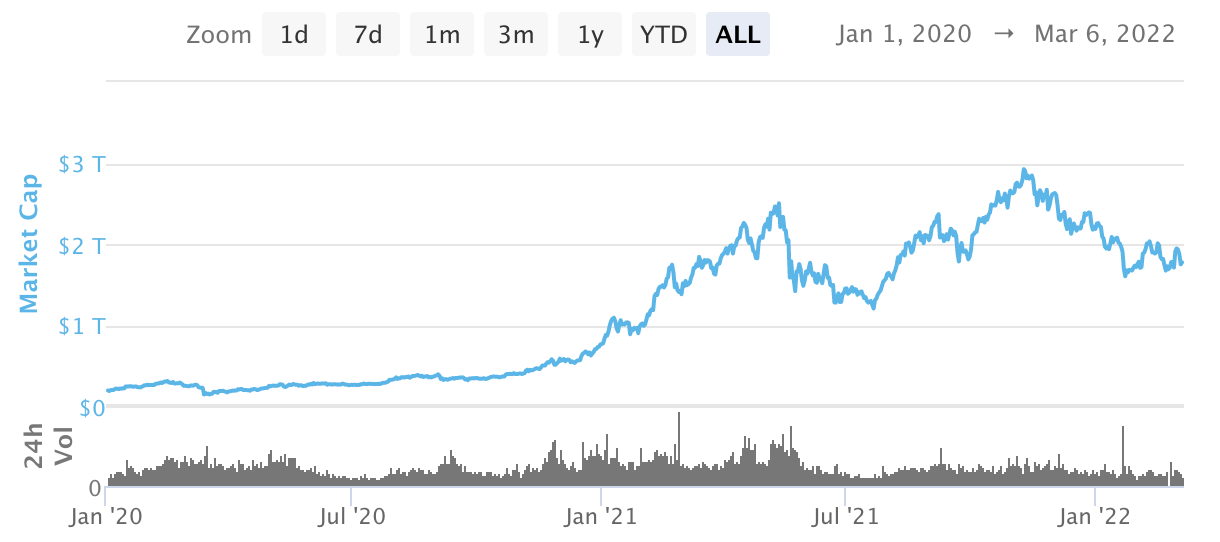Russia's currency lost 40% of its value in a week; Russians are fleeing the ruble and buying cryptocurrency. But so are their Ukrainian neighbours, who have lost their life savings when centralised institutions in their country failed.
When the National Bank of Ukraine suspended the FX market, digital financial services, and limited cash withdrawals, Ukraine found relief on the parallel crypto economy; they have a war to fend off and no time for bureaucracy.
Cryptocurrency is censorship-resistant and knows no boundaries. It's not associated with nor regulated by any central authority. The blockchain plumbing and transaction layers are distributed and can't be shut down; a strong product/market fit in times of war.
Ukrainian officials took to Twitter to appeal to an unlikely audience of crypto "degens" whose portfolios grew with pandemic-fueled crypto investments.
 |
|---|
| Total Cryptocurrency Market Cap since Jan 2020 in trillions (source coinmarketcap.com) |
They were asked to donate Bitcoin, Ethereum, and Tether in exchange for a Ukrainian cryptotoken. As as result, crypto donations poured into Ukraine, but this might not have been entirely altruistic; cryptocurrency projects launched during the ICO craze of 2018 and the COVID year of 2021 saw their value skyrocket "to the moon". In 2022, a Ukrainian token would likely increase in value too. In the end, Ukraine cancelled the token airdrop but will eventually issue NFTs "to support Ukrainian Armed Forces". A non-fungible token with provable ownership would appeal to many for symbolic reasons, despite high minting fees and price.
So far Ukraine raised the crypto equivalent of $60 million USD, mostly in ETH. Due to the DeFi capabilities of Ethereum, Ukraine's government has also been sent valuable NFTs, including a rare CryptoPunk NFT worth approximately $200,000.
| CryptoPunk NFT #5364 worth $200,000 donated to Ukraine |
To put this number in context, $60 million worth of crypto amounts to 3x the aid the UN have pledged to Ukraine in humanitarian relief, raised in a fraction of the time through direct crypto donations to the Ukrainian government and the Come Back Alive NGO without intermediaries.
But will Ukrainians (or Russians, for that matter) actually be able to cash out? Centralised crypto exchanges are not regulated in the same way as banks but are still subject to the regulatory pressures of the countries they're incorporated in. If Russia or any other nation decides to crackdown on crypto exchanges (who convert digital assets to fiat currencies for a fee), people may find themselves with lots of "computer money" they can't actually use to buy food out there in the real world.
The crypto economy is taking on massive proportions and it's being legitimised by unlikely actors - Ukraine, a victim of circumstances, and Russia, an autocratic nation losing the grip on its own economy backed by an increasingly worthless fiat currency.
This is the most recent article in my "Russian invasion of Ukraine" series.